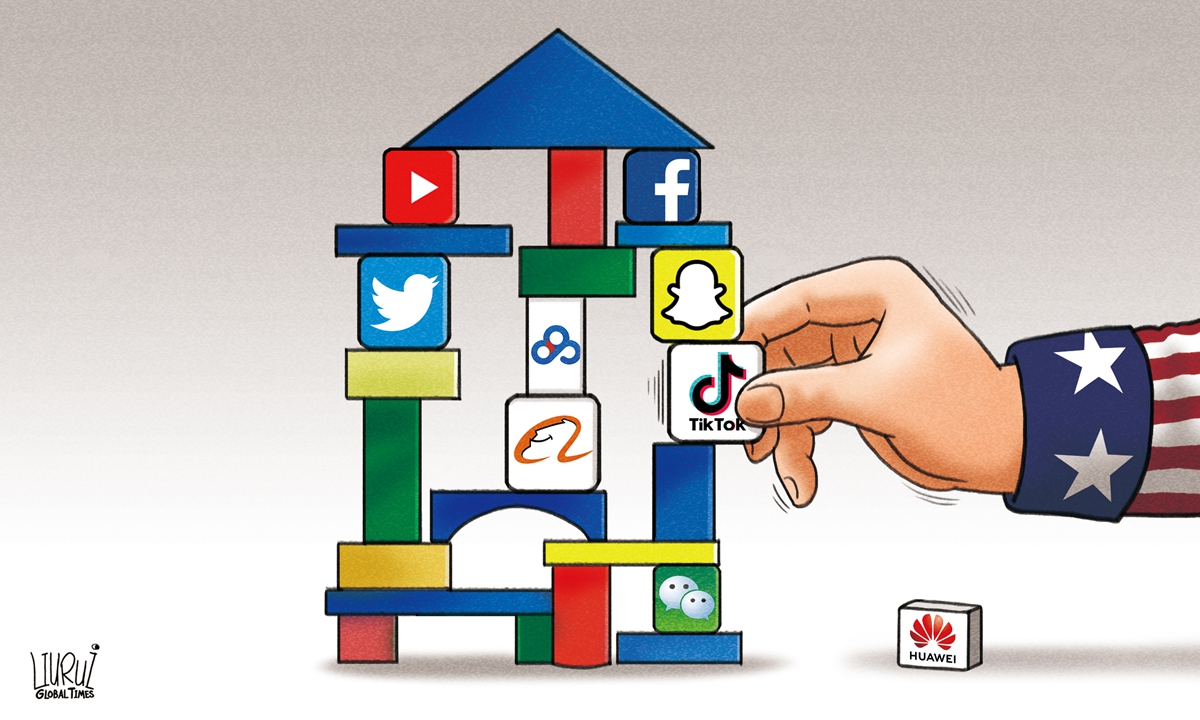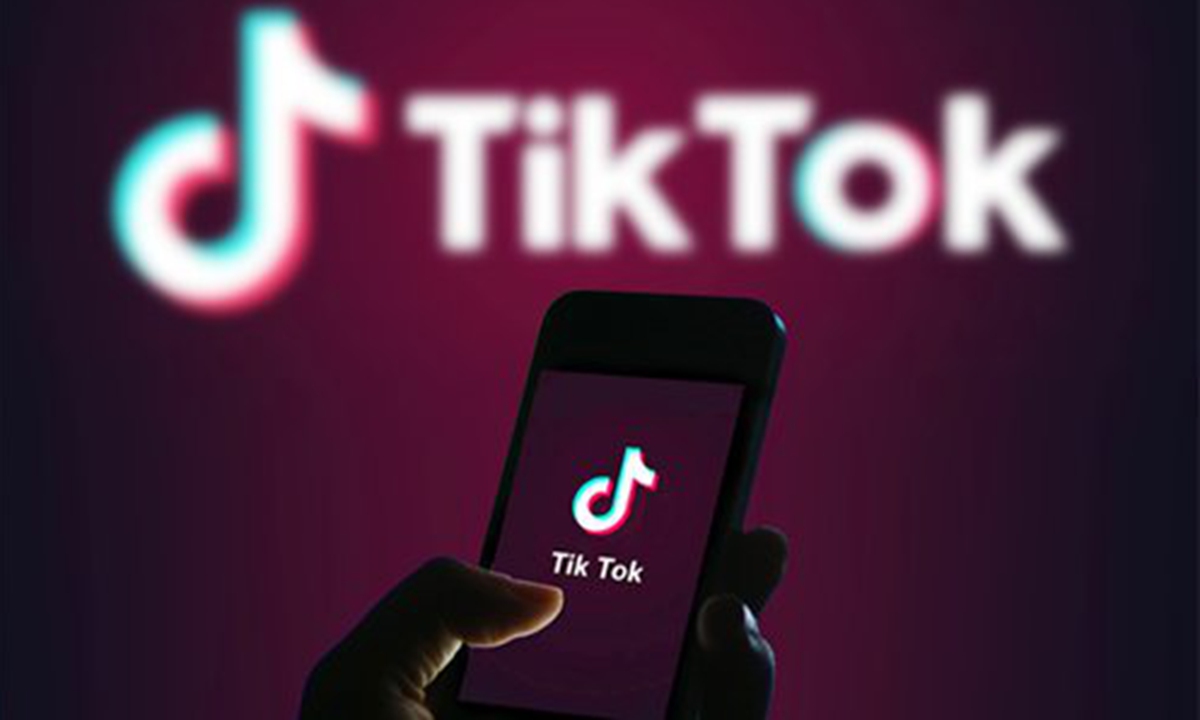
Photo: GT
The US State Department's expansion of its so-called "clean network" initiative, which surfaced a few days ago, reeks of McCarthyism, which was put in its grave long ago by the international community, and is more like a pipe dream and manifestation of a certain madness going on in the US, Chinese analysts said on Thursday.
Headed by Secretary of State Mike Pompeo, the department unveiled on Wednesday (US time) a five-pronged approach to extend its so-called "clean network," which basically means telecom networks will be stripped of anything Chinese.
In the new five-point expansion, the department hopes that efforts can be made to remove Chinese mobile apps from Apple and Android app stores; Huawei smartphones will be prohibited from pre-installing popular US apps; and cloud services offered by Chinese internet giants Alibaba, Baidu, and Tencent will be discouraged.
Chinese telecom carriers doing business in the US and Chinese-invested undersea cables are also being targeted, though the two sectors have previously been subjected to US crackdowns.
Observers pointed out that Pompeo's "clean" network and its expansion program are rife with political schemes and calculations, and are expected to have little effect on Chinese business interests, as the policies require a lengthy and cumbersome implementation period.
The initiative and Pompeo failed to offer a detailed implementation plan, including a timetable and specific actions or policies.
'Laughable' planIn Beijing, the Chinese Foreign Ministry slammed the US initiative as an "arbitrary" action that runs counter to market principles and international trade rules, and is aimed at preserving the US' dominance in
the high-tech sector.
"The US itself has countless stains, yet it talks big on a so-called 'clean network.' This is absurd and laughable," Wang Wenbin, a spokesperson for the ministry, told a routine press conference on Thursday, adding that there has been no security incidence involving the Chinese firms, like exposed US surveillance projects such as the PRISM program.
The US "clean network" plan follows a series of recent crackdowns against Chinese companies, including what some Chinese experts call an "attempted state-sponsored grab" of Chinese video sharing app TikTok this week.
Tencent, China Mobile and China Telecom declined to comment when reached by the Global Times. Other Chinese companies were unavailable for comment as of press time on Thursday.
Chinese experts said the latest move, while part of the US administration's "decoupling" efforts, is mostly aimed at improving the optics of US President Donald Trump's reelection campaign, which is mired in a series of crises, from the COVID-19 pandemic to historical economic declines. Many doubt that the US will follow through the plan in the short term, and the plan will have a minimal effect due to practical issues in its implementation.
Ma Jihua, a veteran industry analyst in Beijing, told the Global Times that the whole thing is pure drama that can be best understood by factoring in the November election.
"The Trump administration has prepared many such slings to throw at China in its skirmish and provocation tactics [before the election]," Ma said.
"The goal is to garner support through a show of 'strength' and to avoid a more meaningful conflict with China in trade, which could blow up its support," Ma noted.
Although Pompeo's threat to ban Chinese apps reminded people of India, which has banned hundreds of Chinese apps in the past weeks, the US government may actually not have as much power as its Indian counterpart.
Nonetheless, Ma said if the US is serious in implementing such threats, it may take about two years under the US legal system to put these policies in place.

Tik Tok Photo: IC
Little effectMa added that the COVID-19 pandemic has forced the US government to apply its offensives too quickly, greatly reducing the effect of each policy statement.
Also, some Chinese internet firms don't have a significant business presence in the US, so a ban on their apps will not carry much impact, and the US cannot prevent users from installing those apps, even if it can persuade or even request sellers not to pre-install them.
Even from the standpoint of boosting Trump's reelection bid, the move might not be as effective as some US officials thought, given that banning apps popular among young voters could spark a backlash, experts noted. Following Trump's threat to ban TikTok last month, many young American reportedly took to social media to attack the Trump campaign.
TikTok reportedly has about 100 million users in the US. Another app, WeChat, has about 19 million users in the US, media reported.
Shen Yi, director of the Research Center for Cyberspace Governance at Fudan University, said the Trump administration's so-called purifying plan is based on one theory - that the US is the world's center and without US markets and users, Chinese tech firms would not survive.
"But such a presumption no longer stands in today's multilateral world," Shen told the Global Times on Thursday.
"Even if the named Chinese firms and apps are forced to retreat from the US market, can the US offer equally good products and services? If it cannot, the policy is nothing more than cutting itself off from the outside world and rejecting progress," Shen said.
In an interview with Xinhua on Wednesday, Chinese State Councilor and Foreign Minister Wang Yi pointed out that
the US is not qualified to build a so-called coalition of "clean countries" because it is dirty, referring to US mass surveillance spy programs over the years.
At Huawei, a Chinese telecommunications leader that Pompeo has spent a great deal of time and energy on, his "clean" imitative carries another meaning.
A Huawei staff member shared with the Global Times his understanding of Pompeo's "clean" network project - "C-L-E-A-N: Clandestine and Lies Enabling American's Narcissism."
Huawei has reportedly divested its undersea telecom cable business.





